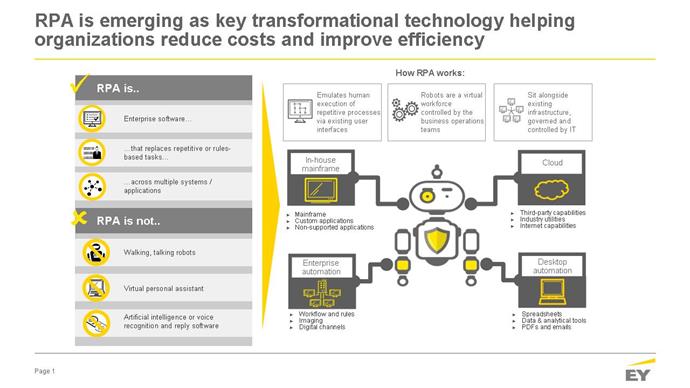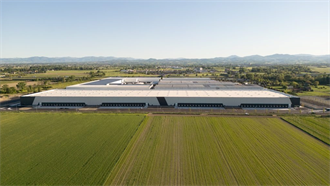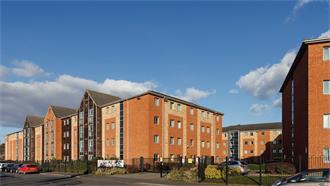Digital transformation is changing the rules of business and competition in the financial industries. Established sectors, such as Real Estate, face new challenges and opportunities due to emerging technologies such as Robotics.
A lot of technological advancement is happening right now around front end retail customer experience and related applications in this space, however back office functions in the Real Estate are still deploying heavily manual processes with no automation, and currently driven by spreadsheets with no leverage on the large data sets available.
It is not surprising that many managers are pushing for a transformation to a more efficient, transparent and structured business environment. One of the big assets of the real estate industry is its richness in available data. The opportunity lays in a holistic solution of not only collecting, but also analyzing and reporting data in order to support and deliver proactive and predictive management support and decision making.
Robotics Process Automation (RPA) is one of the digital technologies that is starting to impact various processes across all players of the Real Estate sector and will unlock long existent pain points. It can help capture, validate and process financial and non-financial data in a far more efficient way.
Robotic has already impacted and is being deployed across many industries, which have been early adopters of technological advancements and is bringing in benefits such as operational efficiency, manual effort reduction, reduced error rates, improved customer satisfaction and even increasing employee engagement.
RPA technology enables a virtual workforce that works faster than a human worker, does not make mistakes, requires no monitoring and can work around the clock. The virtual worker’s activities can be logged and operational metrics can be closely tracked in order to improve or readjust the process flow.
RPA undoubtedly changes the business landscape as it eliminates the need for repetitive and highly manual labor. With increasing coverage of automated processes, a different level of skills is required, namely, the need for people who can create, maintain and define the requirements for automation, as opposed to people who actually process transactions. Preparation and re-skilling is key for both employees and employers.
As more routine tasks and activities become automated, workers can leverage RPA to perform more strategic and high value work and services. RPA also creates solutions in regards to other human labor shortages resulting from demographic trends, weak education systems and under motivated staff.
Some of the biggest benefits of RPA are:
- Support in eliminating low value added repetitive tasks and helps process owners to focus on analysis and strategic decision making
- Faster payback period, as by creating a robotic automated process once, it can be easily scalable, tweaked and become more productive, gaining back the investment in six months to a year
- Better transparency and visibility into processes and the ability to capture detailed data more effectively, with greater accuracy, fewer errors, and less risk of fraud
From a back-office standpoint within the Real Estate value chain, software robots can take control over routine and manually intensive processes. This will save significant time, provide more accurate results, leave a clear audit trail and free up human capital for more value-added and judgment-based functions such as strategic analysis and decision-making. From a front office, customer-facing standpoint, system data can be paired with unstructured data from social media, blogs and other profiles to more accurately gauge the needs and preferences of the customer, allowing for more tailored experiences.
In order to evaluate the right processes that could be automated, the following criteria could be assessed:
- Data intensive
- Repetitive in nature
- Rule-driven
- Multiple- systems
- Electronic trigger to the process
- Involve manual calculation
- High error rates
Applying above criteria across the RE value chain, some of the key processes, which could be potentially be a good candidates for the Robotics, includes:
In order to get started on the Robotics journey, the approach starts with the ideation stage, which identifies the activities to be automated. This process is followed by the creation of business cases. Certain processes are selected based on the business case, followed by development of the prototypes and proof of concepts. Afterwards, the roll-out phase is performed using agile methodology, with automation of processes being done in parallel to coaching of selected employees within the clients’ organization, enabling internal resources to further develop, maintain and modify the robots independently.
Real Estate Operations
- Investor AML/KYC
- Vendor and customer setup
- Deal sourcing research
- Entity & property set up
- Common area maintenance
- Portfolio monitoring
- Portfolio management and reporting
- Budgeting and forecasting
- Partner data consolidations
- Contract management etc.
Finance
- Bank & Account reconciliations
- A/P payment processing
- A/R cash application & follow up
- Fund accounting
- Consolidation
- Financial Planning
- Standard journal entries
- Intercompany reconciliation
- Tax filling
- VAT and TAX preparation, etc.
EY Luxembourg
35E avenue John F. Kennedy
L-1855 Luxembourg





































